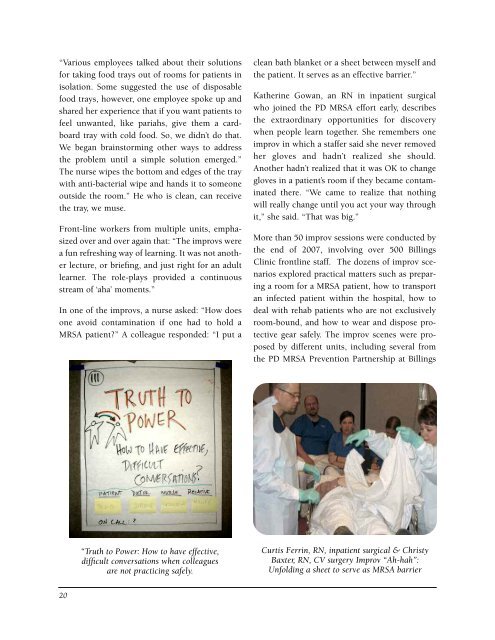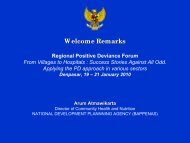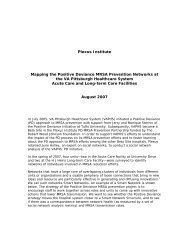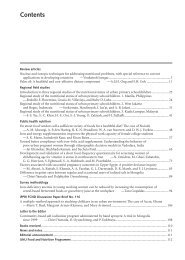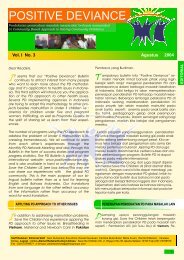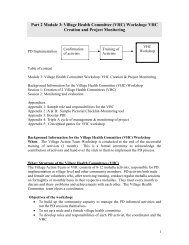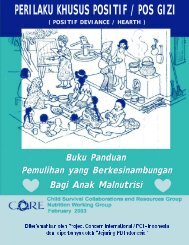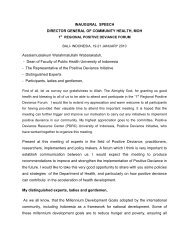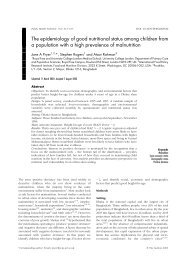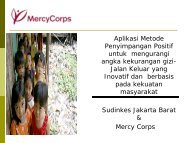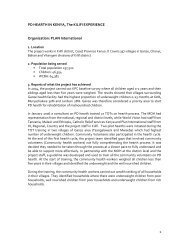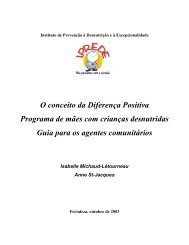From Invisible to Visible - Positive Deviance Initiative
From Invisible to Visible - Positive Deviance Initiative
From Invisible to Visible - Positive Deviance Initiative
You also want an ePaper? Increase the reach of your titles
YUMPU automatically turns print PDFs into web optimized ePapers that Google loves.
“Various employees talked about their solutions<br />
for taking food trays out of rooms for patients in<br />
isolation. Some suggested the use of disposable<br />
food trays, however, one employee spoke up and<br />
shared her experience that if you want patients <strong>to</strong><br />
feel unwanted, like pariahs, give them a cardboard<br />
tray with cold food. So, we didn’t do that.<br />
We began brains<strong>to</strong>rming other ways <strong>to</strong> address<br />
the problem until a simple solution emerged.”<br />
The nurse wipes the bot<strong>to</strong>m and edges of the tray<br />
with anti-bacterial wipe and hands it <strong>to</strong> someone<br />
outside the room.” He who is clean, can receive<br />
the tray, we muse.<br />
Front-line workers from multiple units, emphasized<br />
over and over again that: “The improvs were<br />
a fun refreshing way of learning. It was not another<br />
lecture, or briefing, and just right for an adult<br />
learner. The role-plays provided a continuous<br />
stream of ‘aha’ moments.”<br />
In one of the improvs, a nurse asked: “How does<br />
one avoid contamination if one had <strong>to</strong> hold a<br />
MRSA patient?” A colleague responded: “I put a<br />
clean bath blanket or a sheet between myself and<br />
the patient. It serves as an effective barrier.”<br />
Katherine Gowan, an RN in inpatient surgical<br />
who joined the PD MRSA effort early, describes<br />
the extraordinary opportunities for discovery<br />
when people learn <strong>to</strong>gether. She remembers one<br />
improv in which a staffer said she never removed<br />
her gloves and hadn’t realized she should.<br />
Another hadn’t realized that it was OK <strong>to</strong> change<br />
gloves in a patient’s room if they became contaminated<br />
there. “We came <strong>to</strong> realize that nothing<br />
will really change until you act your way through<br />
it,” she said. “That was big.”<br />
More than 50 improv sessions were conducted by<br />
the end of 2007, involving over 500 Billings<br />
Clinic frontline staff. The dozens of improv scenarios<br />
explored practical matters such as preparing<br />
a room for a MRSA patient, how <strong>to</strong> transport<br />
an infected patient within the hospital, how <strong>to</strong><br />
deal with rehab patients who are not exclusively<br />
room-bound, and how <strong>to</strong> wear and dispose protective<br />
gear safely. The improv scenes were proposed<br />
by different units, including several from<br />
the PD MRSA Prevention Partnership at Billings<br />
“Truth <strong>to</strong> Power: How <strong>to</strong> have effective,<br />
difficult conversations when colleagues<br />
are not practicing safely.<br />
Curtis Ferrin, RN, inpatient surgical & Christy<br />
Baxter, RN, CV surgery Improv “Ah-hah”:<br />
Unfolding a sheet <strong>to</strong> serve as MRSA barrier<br />
20


